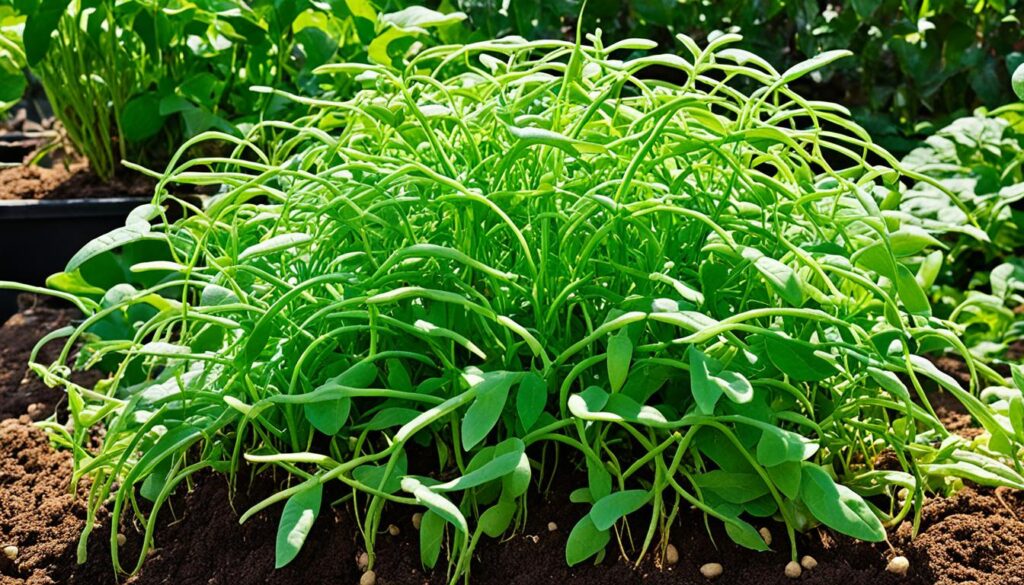Organic gardening is based on the principle that “nature knows best.” By focusing on nurturing the soil and using techniques found in nature, organic gardeners can cultivate healthy and sustainable legume crops.
The nutrient content of organic foods, including legumes, is higher compared to conventionally grown produce. Organic farming practices help prevent soil erosion, water pollution, and the use of harmful chemical pesticides. Organic gardening also provides mental and physical health benefits and can save money in the long run.
By adopting organic gardening techniques, hobby farmers can unlock the full potential of their legume crops, ensuring soil health and promoting sustainability.
The Nutritional and Soil Benefits of Organic Gardening for Legumes
Organic gardening offers numerous advantages to legume crops, providing a wealth of nutritional benefits and promoting soil health. By adopting organic legume farming techniques, hobby farmers can ensure the health and sustainability of their legume crops.
Nutritional Benefits
Legumes grown in organic systems have been found to contain higher levels of essential nutrients compared to conventionally grown legumes. These nutrient-rich legumes offer various health advantages, including:
- Increased levels of Vitamin C, which strengthens the immune system and promotes collagen production.
- Higher amounts of magnesium, which supports bone health and assists in energy production.
- Elevated iron levels, essential for the production of red blood cells and the prevention of anemia.
- Increased phosphorus content, vital for healthy bone development and cell growth.
By incorporating legumes grown through organic gardening into their diets, hobby farmers can enjoy a wholesome and nutrient-dense food source.
Soil Benefits
Organic farming practices prioritize soil health, enhancing the overall productivity and sustainability of legume crops. Some of the key soil benefits of organic legume farming include:
- Increased soil organic matter, which improves soil structure and nutrient availability.
- Reduced soil erosion, as organic farming techniques focus on preserving soil structure and minimizing runoff.
- The use of organic fertilizers, compost, and green manures, enriching the soil with essential nutrients and promoting microbial activity.
- Enhanced soil fertility, leading to healthier legume crops with improved growth and yield.
By prioritizing soil health through organic gardening, hobby farmers can create a balanced environment for legume crops to thrive, resulting in healthier plants and increased crop productivity.
| Advantages of Organic Gardening for Legumes | Inorganic/GMO Legumes | Organic Legumes |
|---|---|---|
| Nutritional Content | Reduced nutrient levels due to synthetic fertilizers. | Higher levels of essential nutrients like Vitamin C, magnesium, iron, and phosphorus. |
| Soil Health | Potential soil erosion and degradation. | Increased soil organic matter, reduced erosion, and improved fertility. |
| Pest Management | Reliance on synthetic pesticides. | Promotion of biodiversity and use of natural predators for pest control, reducing pesticide usage. |
| Sustainability | Dependence on nonrenewable resources. | Sustainable farming practices with a focus on long-term environmental stewardship. |
Practical Tips for Successful Organic Gardening of Legumes
To achieve successful organic gardening of legumes, hobby farmers should follow some practical tips. Start by selecting a suitable site that receives at least six hours of full sun each day and has good drainage. Consider the fertility of the soil and make amendments if necessary, using organic matter such as compost, manure, and green manures.
Organic seed, if available, should be preferred. Practice crop rotation to prevent the build-up of pests and diseases in the soil. Implement cultural strategies for pest management, such as maintaining healthy plants, promoting beneficial insects, and using mulch to suppress weeds. Regularly monitor the health of legume crops and address any issues promptly.
By following these organic legume gardening techniques, hobby farmers can enjoy the benefits of increased soil health, better crop yields, and sustainable gardening practices.

